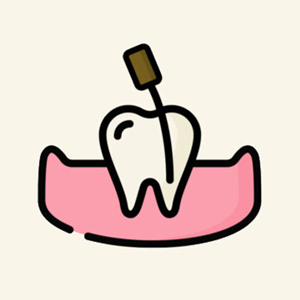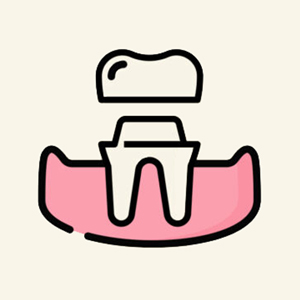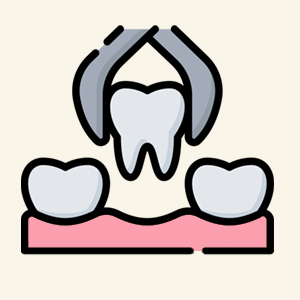Why Choose Chinook Dental Group?
Four Dental Specialties
Receive comprehensive care for four dental specialties.
Appointments Available
Receive timely care and schedule immediate appointments.
No Judgement Services
Receive dental care without feeling embarrassed or uncomfortable.
Dental Implants in Calgary
Dental implants are the most modern solution to missing teeth. It involves placing titanium or ceramic posts into the jawbone to hold artificial teeth such as a crown, bridge, or dentures.
These tooth implants act like the roots of your natural teeth. They help prevent bone loss, stabilize your muscles, and improve support on your lips and facial muscles. These are important factors that other teeth replacement alternatives cannot do.
With the advancements in modern dentistry, we can now create artificial teeth that look, feel, and function exactly like your natural teeth. Learn more about dental implants with our informative read below.

What Are Dental Implants?
Dental implants are artificial tooth replacements. They have the following components:
- Titanium or ceramic post – this is embedded into your jawbone to act as the tooth root. This will fuse with your bone to encourage bone formation and provide additional support for the artificial tooth.
- Tooth substitutes – the artificial tooth depends on the number of missing teeth you have. A single missing tooth will be replaced by a tooth crown. If you have 2 to 4 missing teeth, your dentist will recommend a dental bridge. And for a number or a set of missing teeth, you will need dentures.
- Abutment – this will hold the post and the artificial tooth together so they will not wiggle around when you speak, laugh, bite, or chew.
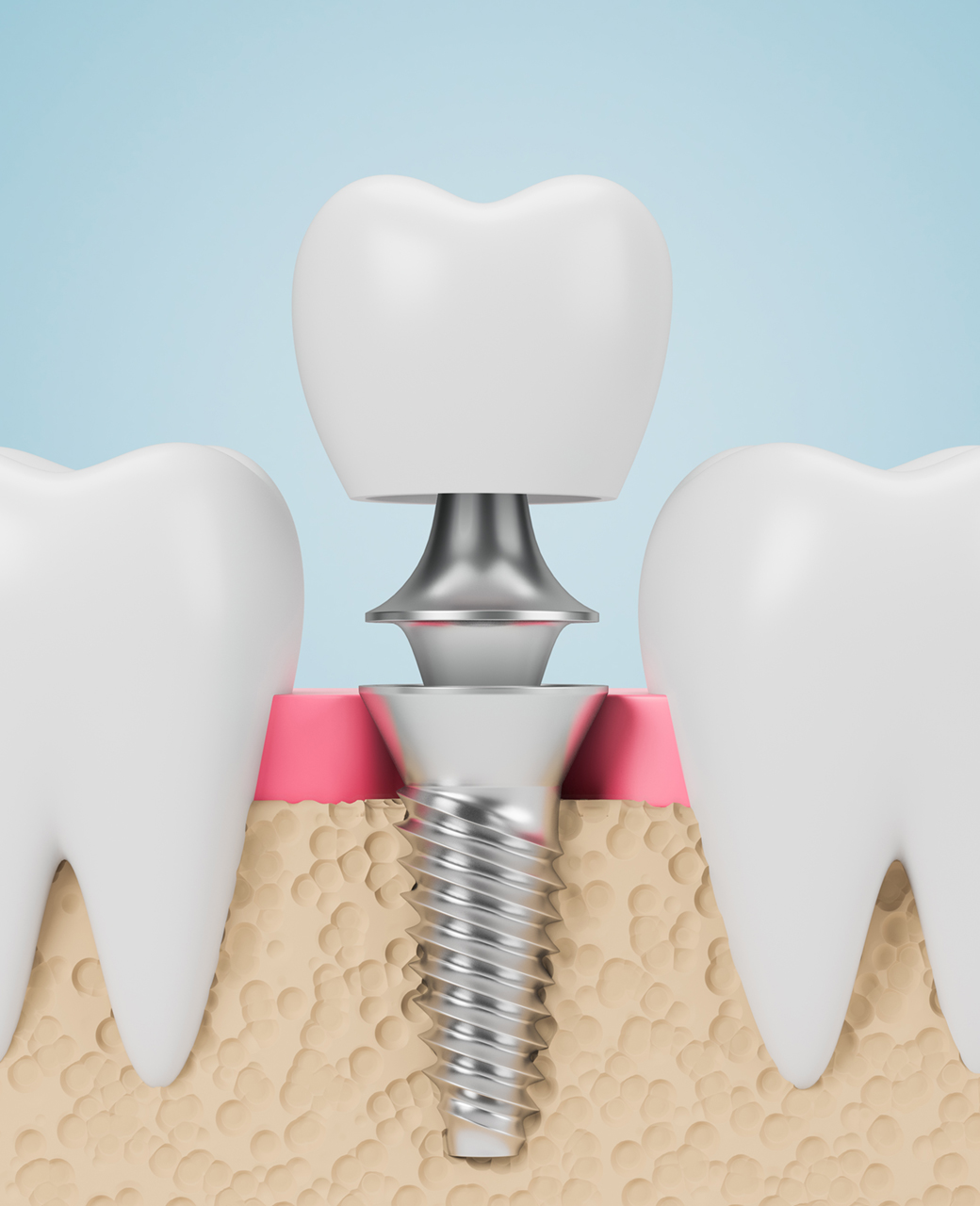
Benefits of Dental Implants
There are many ways in which a dental implant can improve your life, including:
- Improves mouth functions: The main function of the teeth is to allow you to bite and chew food. But missing teeth can greatly affect this, especially if the back teeth or your molars are involved. With tooth implants in place, you can enjoy eating your favourite foods as much as you want without pain.
- Allows normal speaking: Another consequence of missing teeth is the inability to speak properly. You may slur your words and even be a little shy to talk because of a gap in your smile. Dental implants can help restore proper speech without worries of your artificial tooth slipping around or falling off.
- Enhances comfort: Dental implants boast comfort in use because, even after many years, they will not become loose. So, you do not need to worry about dentures moving around. This is because bone support around the titanium post keeps the artificial tooth in place. Tooth implants are a great way to keep you smiling and speaking comfortably.
- Boosts self-esteem: Enjoy your life with a complete set of teeth you can count on. It’s easier to meet new people, do a presentation at your workplace, or celebrate during family reunions. Tooth implants are extremely reliable so you can live your life as confidently as possible.
- Improves overall health: Because you can eat properly with your tooth implants, you receive better nutrients from the food you eat. This helps a lot with boosting your immune system and keeping your health in tip-top shape.
- Facilitates bone growth: The most notable benefit of dental implants over other tooth replacement alternatives is their protection against bone loss. Without your natural tooth, your jawbone will naturally break down over time. But, implants can support bone growth to stabilize your jawbone.
- Promotes a youthful look: Improved bone support with dental implants helps hold the shape of your face and mouth. This enhances your natural appearance and even makes you look younger!
Dental implants are made to last a lifetime. They fuse with your bone so they will remain in place. Over time, the artificial teeth may naturally wear and tear with daily use. But, overall, this type of tooth replacement can serve you well for many years and offer you long-term smile and health benefits.

Who Can Have Dental Implants?
Dental implants involve a meticulous process that requires proper treatment planning to ensure long-term success. That being said, screening patients before the treatment is a crucial step.
Not all patients are good candidates for tooth implants. Ideally, you should be in good oral and physical health to be considered for the procedure. The gums should be in good health and the jawbone should be of sufficient height and thickness.
Medical conditions such as uncontrolled diabetes, autoimmune disorders, or blood-clotting disorders may compromise your healing process. Also, patients who smoke may not be considered for the dental implant treatment. Smoking constricts blood vessels causing failure of the tooth implant.
Lastly, the dental implant process may last many months. The process of bone healing can take 4 – 6 months. So, patients must be willing to commit several months to the treatment.
The Dental Implant Procedure
The dental implant surgery is usually performed in several visits. The first visit is for a comprehensive assessment and consultation for your smile. Using X-rays and scans, your dentist will create your treatment plan. Also, if you still have damaged teeth that need to be removed, your dentist will do that first before the surgery. The next stages of the procedure include:
- Implant placement: The number of implants you need depends on how many teeth are missing. If you have a full set of missing teeth, implant posts will be strategically placed along your jawbone. But for a single missing tooth, just one post will do. These implants are surgically placed deep into your jawbone. Then, your gums will be stitched close. If needed, a temporary removable denture may be given to cover the implant while you wait for healing.
- Healing and bone growth: Over a few months, your bone will grow around the implant post. This will help support the future artificial tooth. Healing and recovery is an important phase of treatment. Without proper integration of your bone with the implant, the treatment will be considered a failure.
- Abutment placement: Once healing is done, the abutment will be screwed on top of the post. This is through a minor surgery that requires opening your gums. Then, you will wait a few weeks for the wound to heal. At this time, your gums should naturally wrap around the implant for a more seamless look.
- Placement of artificial tooth: With complete healing, your dentist can now place your artificial tooth to complete your brand new smile. This can be a crown, dental bridge, or denture. Some patients may require a bone graft before the implant placement. This is for those who have decreased bone density or height. Grafts add thickness to the bone and ensure it is sufficient to receive tooth implants.
Recovery and Aftercare
The process of healing after implants varies for everyone. But, most patients should be able to go back to normal after three days.
Immediately after surgery, you should:
- Rest. Allow your body to heal.
- Place cold compress where there is swelling.
- Eat only soft foods to prevent gum trauma.
- Take medications as needed.
If you have any questions or concerns, do not be afraid to ask your dentist! They will guide you through your recovery period to ease your worries and prevent complications.
Cost of Dental Implants
Chinook Dental Group follows the standard pricing set by the Alberta Dental Association (ADA). This fee guide provides our patients with direct access to the dental treatments we have in our office and their corresponding costs.
Generally, there is no one price for all implant treatments. This will always vary per patient. Such that, a single implant will cost less than an implant-supported full denture. If you need additional treatments such as extraction of remaining damaged teeth or bone grafts, this can hike up the costs.
Our dentist will gladly discuss your fees during your implant consultation to give you a proper breakdown of the cost.

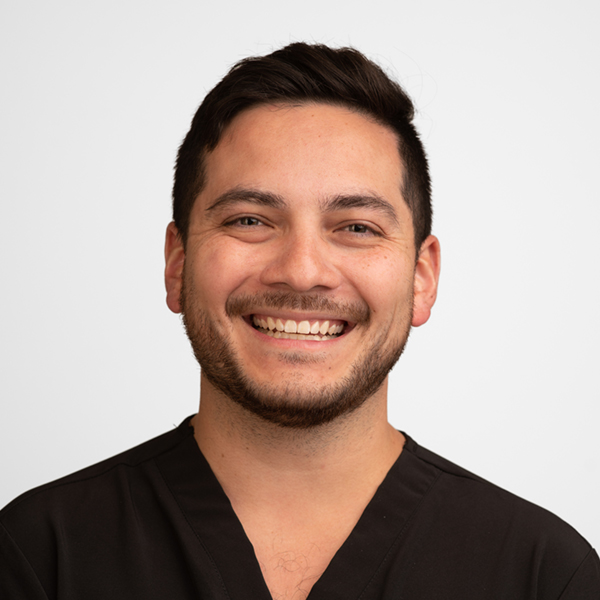
Dr. Javier Cabrales
Dr. Javier Cabrales completed the Graduate Periodontics program at the University of Manitoba in June 2020. Prior to his periodontal training, he received his DMD from the University of Saskatchewan in 2014 and thereafter worked as a general dentist for 3 years prior to entering postgraduate studies.
As a trained periodontist, he specializes in the placement of dental implants and the management of periodontal disease.
Dr. Cabrales is fluent in English and Spanish and was drawn to Calgary for its mountains. When not at work, he enjoys long walks with his dog, snowboarding, cycling, and playing sports such as soccer and squash.

Dr. Choo-Soon Kua, DDS, FRCDC
Certified Specialist in Oral and Maxillofacial Surgery
Dr. Kua is a Certified Specialist in Oral & Maxillofacial Surgery born and raised in Calgary. He received his Bachelor of Science in Kinesiology from the University of Calgary in 2008. Dr. Kua obtained his Doctor of Dental Surgery from The University of Western Ontario in 2012. Following completion of his doctorate, Dr. Kua practiced general dentistry in Calgary and Bowden Correctional Institution for two years before being accepted into and completing his specialty training in Oral & Maxillofacial
Surgery at Montefiore Medical Center in the Bronx, New York. His residency consisted of rotations in anaesthesia, general surgery, otolaryngology, emergency medicine, internal medicine, and critical care medicine. He is trained in all aspects of IV sedation, complex dentoalveolar surgery, dental implants, bone grafting, oral and maxillofacial pathology, and non-surgical temporomandibular joint disorders.
Dr. Kua is excited to offer a broad range of oral and maxillofacial surgery services to Calgary and surrounding areas.


